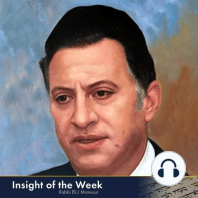20 min listen

Parashat Vayishlah- The Dangers of the Gentle Touch
Parashat Vayishlah- The Dangers of the Gentle Touch
ratings:
Length:
20 minutes
Released:
Dec 10, 2022
Format:
Podcast episode
Description
The opening verses of Parashat Vayishlah tell of how Yaakob Abinu was gripped by fear upon hearing that his brother, Esav, was approaching with an army of four hundred men. He turned to G-d in prayer, pleading that G-d rescue him "from the hand of my brother, from the hand of Esav" (32:11). The question naturally arises as to why Yaakob prayed for protection both from "the hand of my brother" and from "the hand of Esav," which of course seem to be one and the same. A famous answer to this question is presented by the Bet Ha’levi (Rav Yosef Dov Soloveitchik of Brisk, 1820-1892), who explains that Yaakob refers here to the two different ways in which Esav could have planned to meet him. First and foremost, Yaakob feared that Esav would come and wage a fierce war, seeking to kill him and his family, to avenge Yaakob’s taking his blessing many years earlier. But Yaakob also considered a different possibility – that Esav would come as his "brother," seeking love and friendship, with the aim of luring Yaakob away from his beliefs and values. Yaakov pleaded to G-d for protection from both "Esav" – the hostile, violent man who sought to kill him – and "my brother," who might seek brotherhood and closeness, which would pose a grave spiritual threat to Yaakob and his family. The Bet Ha’levi explains on this basis the Torah’s description of Yaakob’s fear: "Va’yira Yaakob Me’od Va’yeser Lo" – "Yaakov was very frightened, and he was distressed" (32:7). Yaakob was frightened by the prospect of Esav coming to wage battle against him, and he was distressed by the prospect of spiritual "warfare," of Esav coming as his brother, in an attempt to establish close ties with him, which could lead Yaakob away from his beliefs and traditions. Indeed, the Bet Ha’levi adds, Yaakob in the end required both forms of protection. Esav initially came with the intention to kill Yaakob, but then, after they met, Esav invited Yaakob to join him, asking that they form a partnership ("Nis’a Ve’nelecha, Ve’elcha Le’negdecha" – 33:12). Yaakob refused, and they parted ways. Hashem thus answered both of Yaakob’s prayers – that he be saved from both Esav, and "my brother." He was saved from Esav’s hostility, and then from Esav’s attempt to lure him through his friendship and affection. These two threats are represented also by Yaakov’s struggle against an angel, which attacked him as he went to meet Esav. The Sages identify this angel as Esav’s heavenly angel, Satan himself. The Torah says that when the Satan saw that he could not defeat Yaakob, "Va’yiga Be’chaf Yerecho" (32:25). This is commonly understood to mean that the Satan "struck" Yaakob’s thigh, dislodging his hip. But the word "Va’yiga" literally means "touched." We could explain, then, that the angel did not strike Yaakob – but rather touched him softly, affectionately. When the Satan saw that he could not defeat Yaakob by force, with hostility, it changed tactics – and treated Yaakob kindly and warmly, like a loving brother. Yaakob emerged from his confrontation with the Satan with only one injury – the injury sustained by the Satan’s gentle touch. The violent blows did not cause Yaakob pain afterward; he suffered long-term pain only from the Satan’s warm friendship – because this is the real danger, when other nations draw us too close to them, and lure us to their values and their way of life. As the Torah tells, we commemorate Yaakob’s struggle with the Satan to this day by refraining from the "Gid Ha’nasheh" – the portion of the animal corresponding to the part of the thigh where Yaakob was hurt. We don’t need to remember the Satan’s violent attack on Yaakob; we are already well aware of the dangers of anti-Semitic hatred and hostility. This needs no reminder, no commemoration, and no emphasis. We do, however, need to be reminded of the dangers of "Va’yiga Be’chaf Yerecho," of the other nations’ gentle "touch," their close friendship. While we certainly must appreciate and welcome their friendship, we
Released:
Dec 10, 2022
Format:
Podcast episode
Titles in the series (25)
Parashat Pinhas: What Did Pinhas See? by Insight of the Week